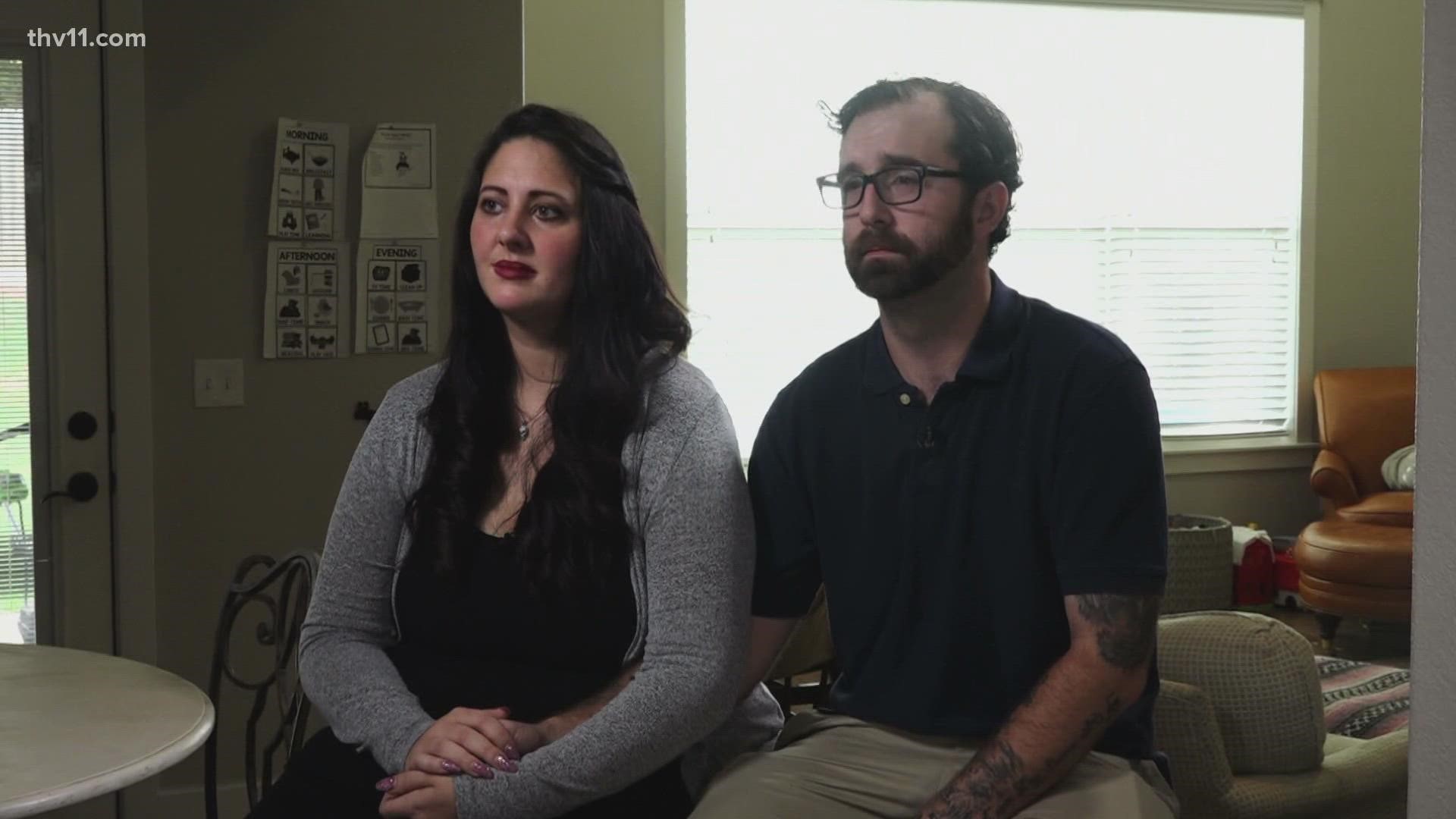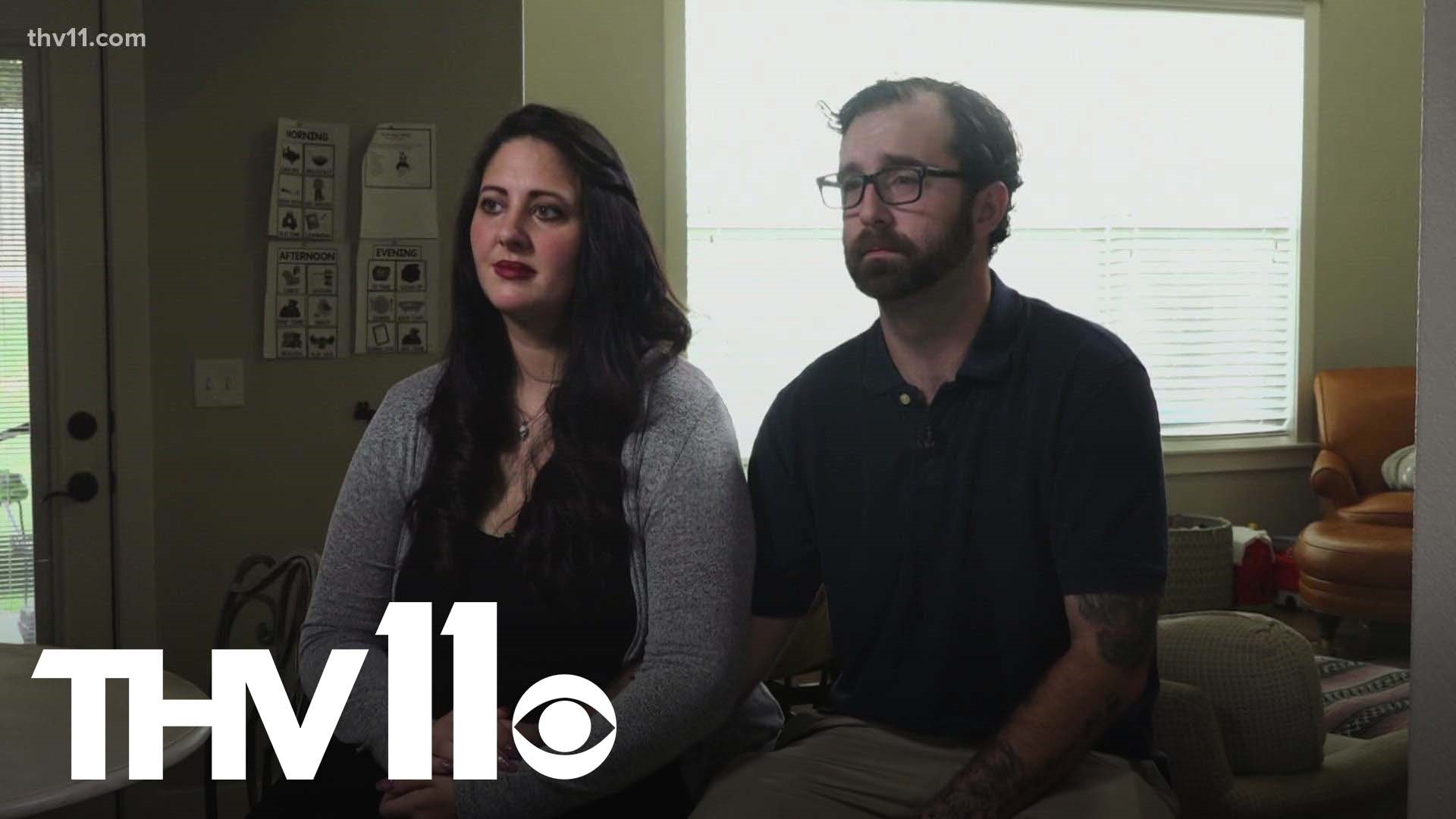"Our baby was wanted and loved." Complications of Arkansas's abortion ban
An Arkansas family traveled hundreds of miles to get abortion care out of state due to legal blocks—and were forced to make a decision they never imagined.

The Supreme Court’s decision to overturn Roe v Wade in June has led a number of states, including Arkansas, to enact abortion bans.
The law in Arkansas is broad and has left doctors, legal experts, and mothers to wonder what medical options are available to patients.
We followed the journey of an Arkansas family who traveled hundreds of miles to get abortion care out of state— as well as the emotional journey that they endured when they were faced with a decision they never thought they’d have to make.
Meet The Stovalls
Chelsea Stovall is a mom, and most days she has her hands full.
She typically stays home with her two & four-year-old kids while her husband Thomas, a retired veteran works as a fire safety inspector.
"I grew up in a very big family. And I wanted some– I didn't want five kids. But I wanted three, maybe four," Thomas said.
The couple was overjoyed in April when Chelsea found out she was pregnant again.
"We had everything, we were getting ready to paint the room and everything," Thomas said.
"We told everyone that day we're gonna find out if we're having a boy or a girl. And so we found out we're having a girl," Chelsea added.
The Stovalls were ready and had even decided they were going to name the baby, Winter.
Complications Arise
"Everything was healthy until it wasn’t," Chelsea explained.
When Chelsea was 19 weeks pregnant, the Stovalls found out they were having a girl. Though they were glad to hear the news, that day brought tragic news as well.
"We found out that she was developing without a diaphragm and that her stomach and intestines or organs had been strangling her heart and they'd been compressing the lungs," Chelsea said.
Thomas added, "Doctors gave us a stat as one in every 3500 babies this happens to and there's no explanation for it."
The heartbreaking news led to weeks of doctor's appointments and second opinions.
"So my OB, she said that the baby is not viable. And that she had a chance to make it full term, but that was most likely not going to happen. And even if she did, there was a very small chance that she would survive the surgery that she would need right after being born," Chelsea explained.
Legal Blocks After Roe V. Wade
In June the Supreme Court struck down Roe v Wade, which triggered Arkansas’s abortion ban. This added to the Stovall's complications, and thus created many legal hoops that Chelsea and her husband had to jump through.
"I'm gonna say this as clearly as I know how and as clearly as the law states, the only time that a lot that an abortion is legal in Arkansas is to save the life of the mother," Arkansas Attorney General Leslie Rutledge said moments after she signed the state’s abortion ban into law back in June.
Since that statement was made, there has been no additional clarification on the law.
Chelsea carried a higher-risk pregnancy and was told her baby wasn’t likely to survive, but because Chelsea’s life wasn’t immediately at risk, though if it could be, later on, legally she couldn’t end the pregnancy in Arkansas.
Her situation left doctors scared to even suggest ending the pregnancy as a medical option. Thomas explained that the legal complications led to frustration at the doctor's office.
"These doctors are scared to talk or scared to say certain things because they're scared of the backlash themselves; because they are worried. They shouldn't have to... call a lawyer before they tell a patient something," he commented.
"Who do you ask questions to I mean, if you can't trust the person that is literally in charge of your health, your life?" Chelsea added, "And I asked questions, but [my doctor] could only sort of phrase it certain ways or say certain things and sort of hint at other things so that she didn't get in trouble."
The Search for Medical Care Out Of State
The newly enacted abortion ban in Arkansas left the couple out of options for care in The Natural State— so with a growing health risk for Chelsea, the Stovalls made the decision to go out of state for care to terminate the pregnancy.
Chelsea added, "Our baby was wanted and loved. You know, she, unfortunately, had some fetal anomalies that that, you know, she wasn't going to make it but I should be able to say goodbye to her where I want to. I should have my doctor who delivered my other two babies, be able to deliver my third baby."
Chelsea made a doctor's appointment at the closest place she could find where she could get legal healthcare while being 20 weeks pregnant.
She was able to get an appointment at the Hope Clinic for Women in Illinois, about 400 miles away from where she lived.
"There's so much that went into it... we had to find a babysitter for our kids, we had to find the money. I mean, it was expensive. People don't realize health insurance isn't going to cover it, especially when you have to go out of state," Chelsea explained, "I mean, we had to go into savings, to be able to drive there to pay for gas..."
This decision cost the Stovalls thousands of dollars.
Illinois Abortion Clinic Sees Out-Of-State Patient Surge
The Hope Clinic in Illinois stated that about 3-5 Arkansans have appointments with them daily, which equals out to a few dozen a week, or about a hundred Arkansans a month.
Those Arkansans have all endured the same journey as Chelsea for the care they weren't able to get at home.
Amy Redd-Greiner schedules and prepares patients for their appointment, and she stated that the clinic was already busy before the Roe decision was made.
Since then their overall patients have gone up about 30%-- which has pushed them to the brink.
"Every single person is working at their max capacity... we are maxed out," Redd-Greiner said.
The clinic’s parking lot has been regularly filled with out-of-state license plates.
Redd-Greiner added, "I would say it's some, like, 90% of our patients are from out of state now."
And workers haven't just been preparing patients for appointments but also preparing them for protestors they might face, that sometimes visit the clinic by the busload.
Chelsea explained, "When I called to make the appointment, I was warned about the protesters, and I was given tips on how to deal with them."
Thomas added that while he supports the right to protest, he felt that many of them he saw outside the Hope Clinic took it too far.
"...stand out there and protest all day. I don't care. But they had billboards, and I mean, massive, massive billboards of babies that are just dismembered. And these women that are going into these places, like my wife, they're already traumatized enough," Thomas added.
This whole experience pushed Thomas to a side of the picket line he never expected he would be on.
"It was a monumental change for me. Like I said, I grew up believing it was wrong, like wrong, like it was instilled-- bible-- fire and brimstone thrown in my head. I don't believe that way anymore. I just think every woman should have the choice, that women should have the choice to get an abortion if they want to. It's not a dirty word," Thomas said.
The experience also changed Chelsea’s view on possibly trying again.
"I'm very scared thinking about getting pregnant again, especially living in Arkansas. Because I know that once I get pregnant, I stopped mattering. My physical health, mental emotional, stops becoming a priority," Chelsea explained.
The Hope Clinic has continued to work to stay open under immense demand from more patients as more abortion bans have gone into effect in states across the country.
There's also been early talk on capitol hill of a protentional nationwide abortion ban.
"We are ready to build out. Once we are comfortably meeting the capacity that we you know, aim for, then we will look to expand capacity again," Redd-Greiner commented.
The clinic said they won’t turn anyone away, even though they continue to work beyond their limit and have for the past couple of months.
Redd-Greiner added, "It isn't a matter of, can we, it's a matter of how can we not?"
Beyond The Appointment
Chelsea said this goes beyond choice, and that many of these laws don’t account for people like her– who plan for pregnancy but encounter unpredictable health risks.
"It's not as black and white as people think, it's happened to us, you know, it's happened to me. That makes me feel like a second-class citizen. I mean, it makes me feel like, like, I don't matter in comparison to a man," Chelsea explained.
The Stovalls have seen their story, not as a rare occurrence – but as one of the hundreds that have been forgotten by law— a story they hope can help bring about change.
Thomas added, "I was a die-hard southern person who believes that abortion was 100% Wrong, no matter what the case if I can change, what’s to say the rest of the world can’t change."
The journey for care doesn’t always end when patients return home. Chelsea had further complications after her procedure in Illinois.
Fortunately, she’s healthy after she was able to receive treatment back home in Arkansas. The Hope Clinic said getting treatment back home might not always be an easy option for an out-of-state patient.
That can create another hurdle in patients getting the care they need.
When we reached out to the Attorney General’s Office and they said there have not been any further interpretations or updates to the abortion ban since it was first signed into law.


